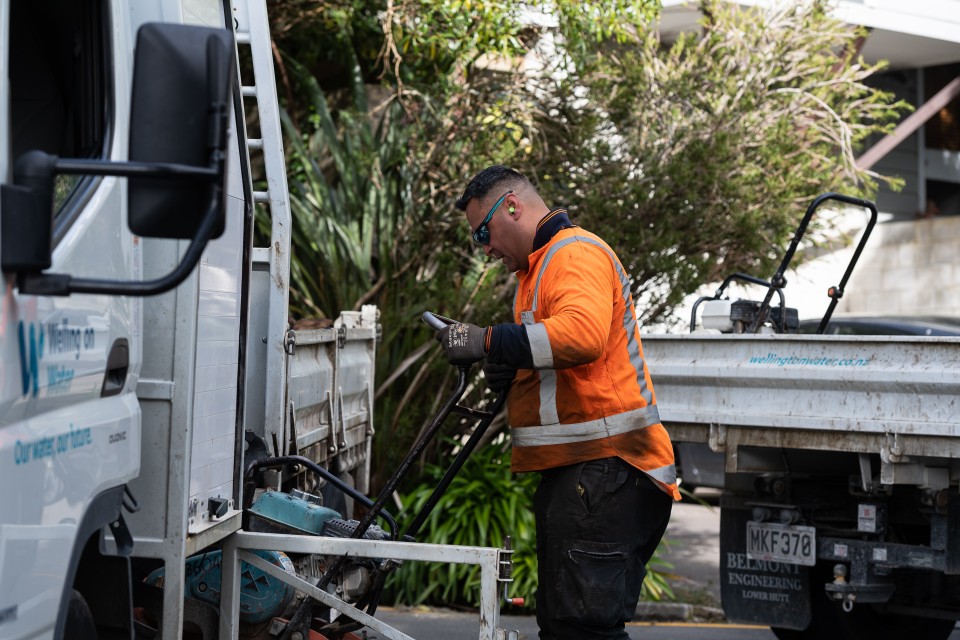Porirua Central Wastewater Storage Facility
On behalf of Porirua City Council, we are building a new Wastewater Storage Facility at a central point in the Porirua wastewater network (north of the railway station carpark) to reduce overflows of untreated wastewater.
If you have any questions about this work, please contact:
Wellington Water, 04 912 4400
Latest Updates
As 2024 draws to a close, good progress continues.
What a difference a year makes - watch this video to see progress over the last 12 months
Check out the latest time lapse video from October 2024.
Background
Currently when it rains heavily, pipes and pump stations can get overwhelmed by the volume of water, and some wastewater may overflow into the environment.
The facility will capture and hold stormwater and wastewater at times of peak flow, then gradually release it at levels the network can carry to the treatment plant.
The current City Centre pump station “20” is a bottleneck and the largest location of overflows into the Porirua Stream and Harbour. The facility will take the pressure off by managing flows through two weirs and a pump station and holding water temporarily in the large storage tank.
The facility will only hold stormwater and wastewater temporarily, at times of peak flow during and after heavy rain.
The process
For a healthier harbour and coastal waters, we need to reduce the amount of untreated wastewater overflowing from the network. Overflows happen when wet weather increases the amount of water flowing through the network beyond the amount the pipes can carry.
To reduce overflows, we’re building a new storage facility in central Porirua (see conceptual videos below), located north of the railway station (see map below for location) and an artist's impression of the completed facility.
Storage facility flyover
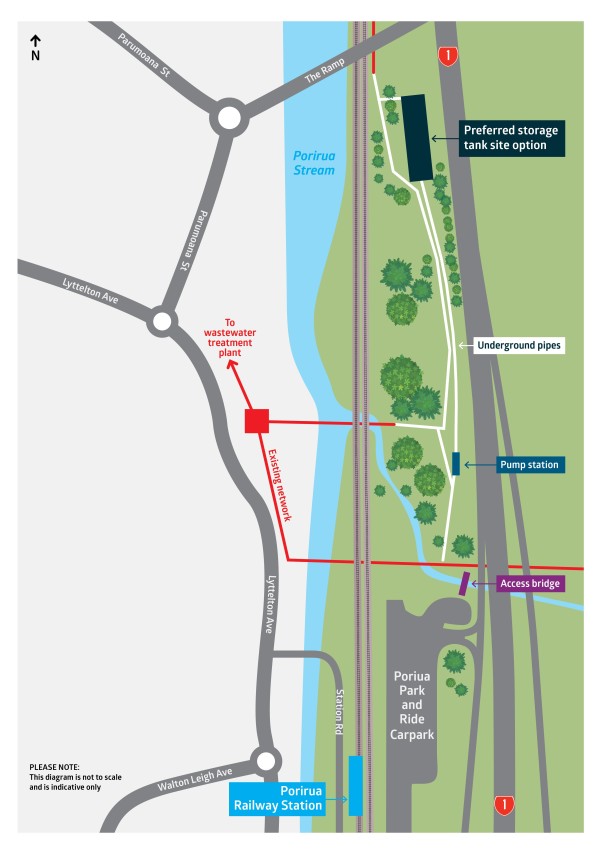
Location of central storage facility
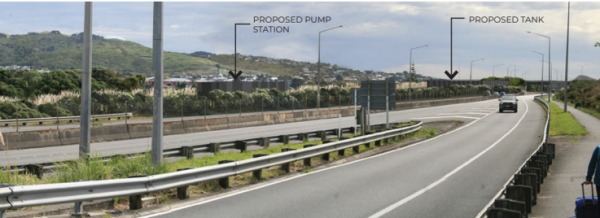
Facility site from SH59 five years on
The facility will:
Capture and hold wastewater at times of peak flow, such as after heavy rain, then gradually release it at levels the network can carry to the treatment plant.
Store up to 7 million litres of wastewater, almost equivalent to three Olympic size swimming pools.
Significantly reduce overflows into Porirua Stream.
While the Porirua central storage facility will not stop all overflows from the wastewater network, it is an important part of the solution.
FAQs
How will the facility work?
Currently when it rains heavily, pipes and pump stations can get overwhelmed by the volume of water, and wastewater overflows into the environment.
The current City Centre pump station “20” is a bottleneck and the largest location of overflows into the Porirua Stream and Harbour.
When the new facility is completed, peak volumes of wastewater from the north and east of Porirua will pass over weirs and into a pump station on the site, and be diverted into the temporary storage tank. The wastewater will then be gradually released at levels the network can safely pump to the treatment plant.
The tank can temporarily store up to 7 million litres of wastewater, which is enough to reduce overflows from about 12 times a year to about two.
The tank will only hold stormwater and wastewater temporarily, at times of peak flow during and after heavy rain.
It will be flushed out after each use.
Find out more about the wastewater network here
What is the timetable for construction?
Construction began in late 2022 and is due to be completed in 2026.
Will there be landscaping?
Yes, we are planning extensive planting, with a combination of kowhai/ngaio coastal forest, kahikatea/ marsh ribbonwood swamp planting, and carex, tussock and rush on stream margins. Planting will screen the tank from view.
We are working with Ngāti Toa and Porirua City Council on the landscaping planning.
Has Ngati Toa been consulted?
Yes, Ngati Toa has been consulted and is supportive of the facility because it will contribute to reducing pollution of the harbour from wastewater overflows. Ngati Toa continues to be closely involved in planning and construction.
How was the site selected?
Several sites were considered in and around the centre of Porirua and assessed against a number of criteria. The current site was preferred for a number of reasons including:
-
It is currently unused, so there is no disruption of current users
-
It is publicly owned
-
It is well located for network integration as the three main sewers to feed into the storage are both located within the land parcel.
What will be the impact of construction on the Kenepuru Stream?
We are carefully planning construction to minimise the impact on the environment, including both the Kenepuru and Porirua Streams. Over time, the tank, pipe upgrades and other improvements will reduce wastewater overflows which will be good for the health of the streams and the harbour.
What about the wetland on the site?
Construction of the tank and related pump station and pipes is being planned to avoid the wetland as much as possible. The existing wastewater pipes that sit under the wetland are being replaced and diverted around the wetland. We will restore areas impacted by construction.
What will the impact be on parking and access to the park n ride carpark?
A small number of carparks (42 out of a total of 1000 parks) near the site access at the north-eastern corner of the carpark will be temporarily out of action. However the remainder of the carpark will be unaffected. Access to the carpark will also be maintained.
We will monitor the carpark usage and if there is a shortage of parks then we may look to open up an additional section of parking.
What steps will be taken to minimise disturbance for native species living in this area including birds, skinks, geckos, fish and other aquatic life?
Care will be taken throughout construction to minimise the impact on the habitat of native species. We have involved specialist ecologists in developing detailed plans.
Is this facility designed to withstand earthquakes?
Yes. The facility is designed for a 100 year life and to withstand a one-in-a-thousand year seismic event. Wellington Water is aware of the estimated location of known fault lines in the Porirua area, and these do not go directly through the site. We have completed extensive geotechnical investigations on the site to assess the seismic risk from liquefaction and geological hazards, and this has been taken into account in the design.
What about climate change?
This tank, as with all new Wellington Water infrastructure, is designed to take account of climate change predictions, including predicted sea level rise and increased intensity of rainfall.
Will the tank be big enough for a growing population?
The tank is one of a number of improvements to the wastewater network that will together ensure the network is able to manage predicted population growth.
All Updates
Over the year, about 120,000 person hours of work, and 5000 cubic metres of concrete have gone into the construction of this massive storage tank, pump station and weirs.
Currently there are an average of 50 people on site each day. We’re on schedule for the project to be completed in July 2026.
Pump station weir
Storage tank and harbour
After Christmas, work will commence on the roof of the tank and the big main pipe form the pump station to the tank. We’ll also complete the pump station super structure including electrical and mechanical fittings by about April.
Inside the tank
It's great to see the wastewater storage facility really starting to take shape. This will be a vital piece of water infrastructure to increase capacity and build resilience to improve outcomes for Porirua City residents and the health of Te Awarua o Porirua.
People using the Porirua Station carpark may see more truck movements in coming weeks as our contractors start excavating to lay pipes between the new structures on the site. The trucks will be transporting
material from the site at the northern end of the carpark to the stockpile area at the southern end.
For safety, the trucks will avoid peak hours, operating from 8.30am to 4.30pm, Monday to Friday.
Wellington Water’s contractors are making good progress as shown in the video below.
- Both weirs are complete
- The pump station wet well is nearing completion, and the super structure should be complete in early 2025
- The tank floor is complete, and 40% of the walls are complete
We have poured approx. 3,000m³ of concrete, of a total of 5,000m
This week has seen the first concrete pour for the walls of the storage tank at the facility. This is the first of 14 wall pours that will make up the overall tank perimeter.
It’s 6.5m high, 12m long and 600mm thick.
- In total there is approximately 800m3 of concrete in the walls
- There are approx. 40 operational staff onsite and we have completed approx. 90,000 hours to date on the project.
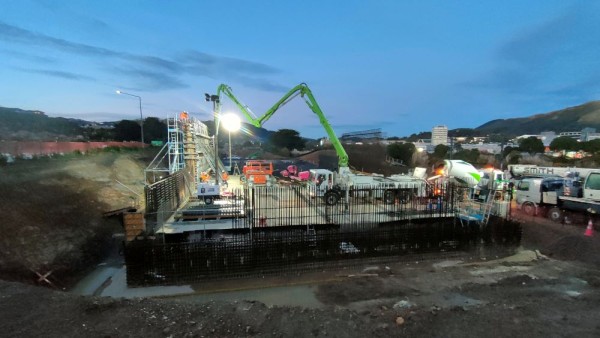
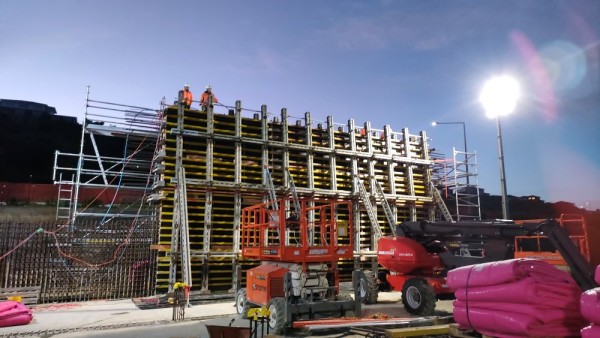
The crews continue to make good progress as shown in this video. In April and May there’ve been some 4 am starts to pour concrete over reinforcing to form the storage tank base and walls, while construction of the pump station and weirs continues at the southern end of the site.
There was approximately 200 cubic metres of concrete poured in each of the pours shown in the video!
Construction has benefitted from the dry weather over the summer with the tank earthworks and all piling (tank, pump station and two weirs) now complete. Excavation of the pump station wet well and staged construction of the tank walls is due to start this month ( May).
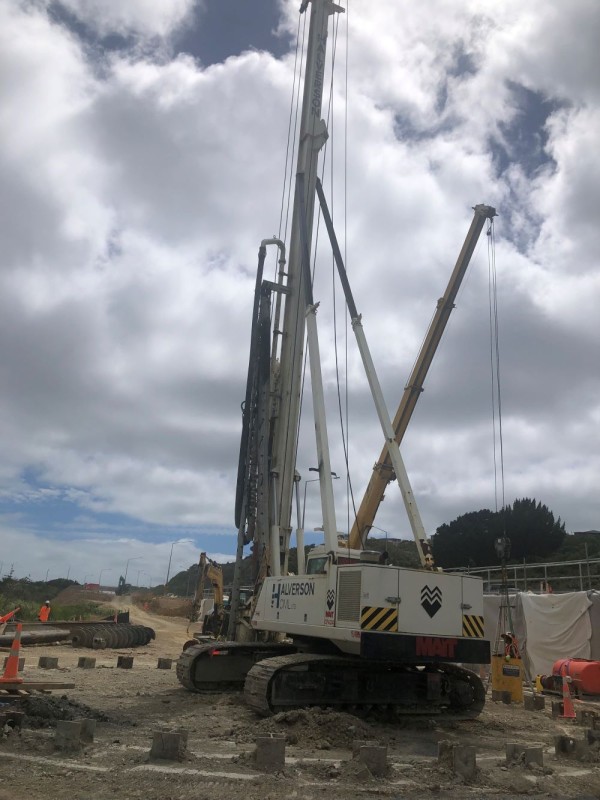
Piling complete
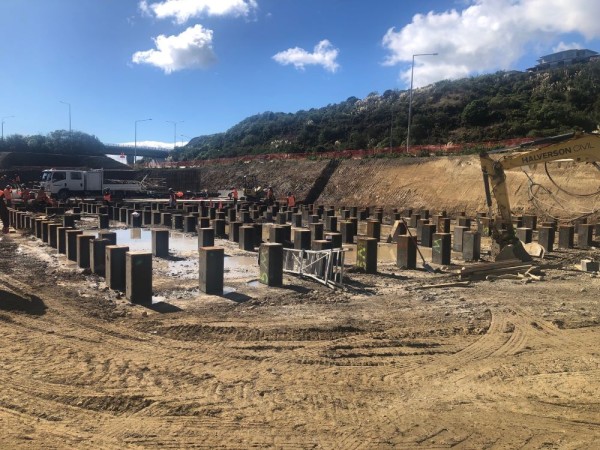
South end piles
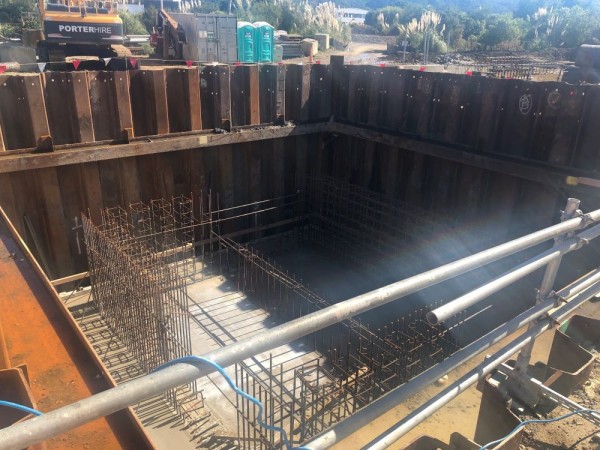
Paremata weir
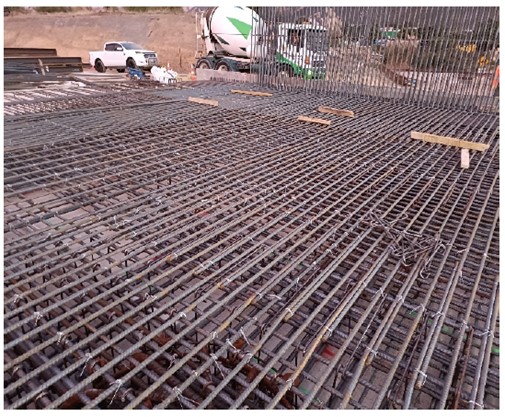
Floor reinforcing
Porirua Mayor Anita Baker and councillors visited the wastewater storage facility construction site, next to SH 59 to get a first hand look at progress.
The construction of the facility tank and associated infrastructure is on schedule, due for completion in 2026. Piling has been completed, with 550 piles underpinning the seven million litre tank. Foundations are also being completed for the pump station and two weirs, which will help control the flow of wastewater from the north and east.
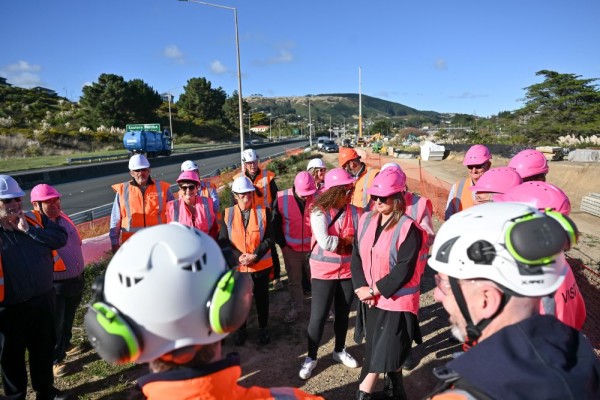
Successfully rehoming skinks
A thriving population of protected native northern grass skinks has been successfully relocated from the construction site. The skinks are a protected species under the Wildlife Act, meaning a Wildlife permit from Department of Conservation (DoC) was required to relocate them before any work could start on the land where they live.
During September and October around 60 skinks have been salvaged and rehomed by contractors Wildlands Ecological Services - each one weighed, measured, and individually photographed in the process.
“All the females that were big enough to reproduce, were pregnant, giving them a good chance of establishing themselves in their new home,” says Wildlands ecologist and herpetologist Florence Kelly.
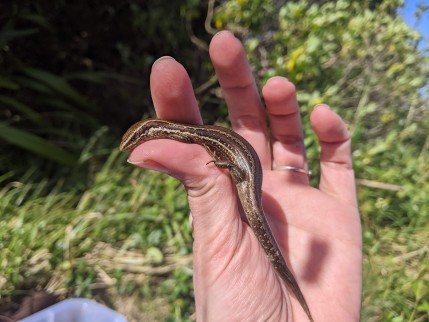
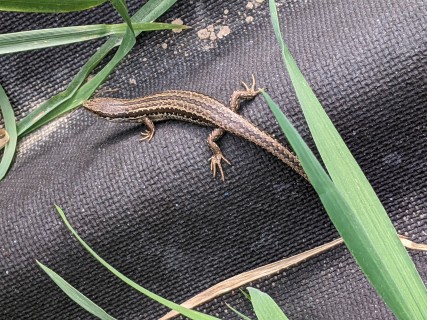
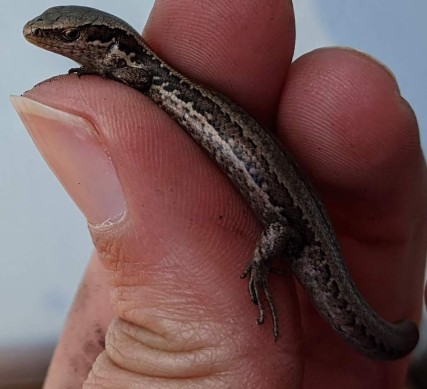 To safely capture the skinks, special covered ‘traps’ are used, baited with a fruit treat and with some damp hiding places to help the lizards feel safe and to protect them from dehydration. They are checked every day once set.
To safely capture the skinks, special covered ‘traps’ are used, baited with a fruit treat and with some damp hiding places to help the lizards feel safe and to protect them from dehydration. They are checked every day once set.
“They’re safe places for skinks to hide and warm up, and also attract some of the invertebrates that lizards eat. The skinks can come and go as they like, but they provide an attractive place for them to hang out.”
Six skinks have also been relocated by hand during the process of clearing vegetation, which was supervised by Widllands.
The skinks have been relocated on site into a nearby significant natural area. They are being protected from the works with a fence to stop them re-entering the site. They are also being protected from predators such as mice, rats, and hedgehogs with targeted bait stations before, during and after the relocation.
“We have put in place log piles, which they like because they provide hiding places, areas to bask in the sun, and attract invertebrates to eat. Some of the flaxes on site were also moved into their new habitat. These are great for skinks!”
Once the works are complete, more habitat will be created with skink-friendly plants such as Coprosmas, Hebes, grasses, flaxes, and vines, and some rock piles that they also like.
“We will then monitor the uptake of those new habitat areas over the next few years, to see how the skinks use the new areas of habitat, and how the skinks are doing.”
Wellington Water’s head of major projects Gary Cullen said rehoming the skinks was required as part of getting consents for the project.
“We had to wait until Spring to rehome the skinks, which did delay the start of earthworks at the northern end from May, but our contractors are now making good progress.
“Looking after our precious native species is both a regulatory requirement and a priority for us as we build this crucial new piece of infrastructure for Porirua city. Ultimately the project will enhance habitats with planting and protect the envrionment and local waterways.”
Florence says New Zealand has some 127 native lizards (including skinks), all protected under the Wildlife Act, and most of them in trouble.
“And, more are being identified every year. So, it’s important to look after them. They are slow breeders, and an important part of the ecosystem but often fall victim to predators such as cats, rats, mice, hedgehogs, and mustelids.”
You can help to protect lizards in your garden by providing tightly branched plants such as Coprosma propinqua, fruiting vines such as Muehlenbeckia complexa, and grasses such as Poa cita. Add in a few logs and rockpiles for them to hide amongst, and trap for predators in your back yard. If you have a cat, consider keeping it inside, or put some wire mesh over the habitat you have created for the lizards.
It’s all go on the site of the new Porirua wastewater storage tank; with earthworks to prepare for the construction of a pump station at the south end and a retaining wall to provide access to the storage tank site at the north end. And the team’s collecting the native skinks living in the area to safely relocate them.
Check out our time-lapse showing progress on site!
This project will help reduce overflows of untreated wastewater into the harbour, which is good for people and the environment.
If you’ve driven or got the train through Porirua recently you may have noticed this big rig on the site of the new wastewater storage tank.
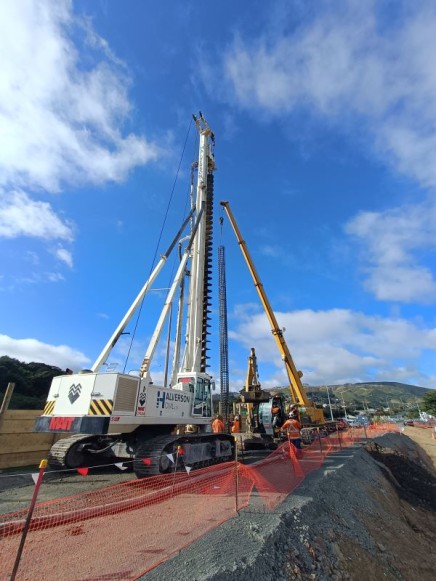
Our contractors Downer are using this piling rig to put in piles for a 100m long retaining wall that will provide access into the main storage tank area. This pile is one of over 400 that will be completed on the project.
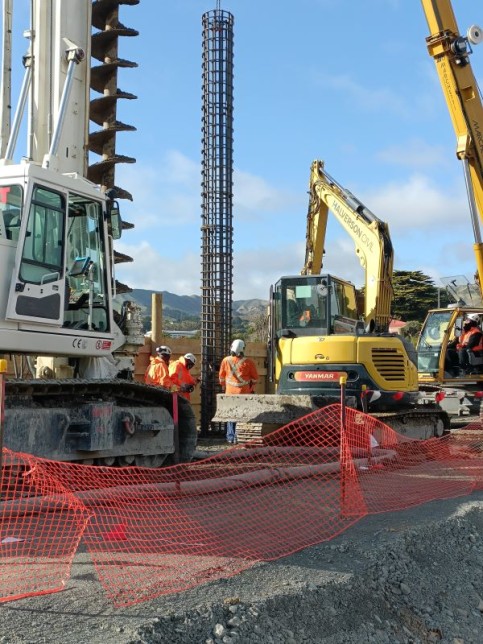
It’s great to see progress on this important project that will help protect the stream and harbour.
This photo shows the extent of earthworks underway in preparation for the construction of the wastewater storage tank, pump station and associated infrastructure.
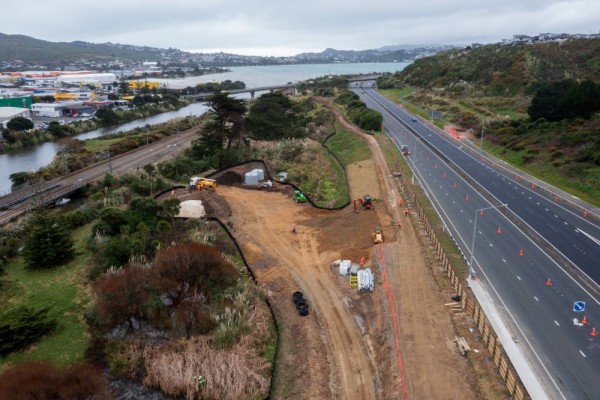
In May, earthworks will start at the south side of the site, with construction of the tank itself beginning after winter. Extensive planting of kowhai/ngaio coastal forest, kahikatea/ marsh ribbonwood as swamp planting, and carex, tussock and rush on stream margins will screen the tank from view. Read more here.
There will be temporary changes to access to the underpass from the Poirua Railway Station carpark to Mepham Place, from 16 January 2023.
Pedestrians and cyclists will be diverted along an alternative path around the construction site in the north east corner of the carpark, which includes a set of steps. Cyclists will have to dismount and walk through this section.
Alternatively, people can use the southern underpass, from the southern end of the carpark to Mungavin Avenue.
We apologise for this temporary disruption, which is necessary while we complete work on upgrading the path under the new access bridge over Kenepuru Stream.
We aim to complete the work in early February.
The access bridge is critical for the construction of a new wastewater storage tank and related infrastructure, which will reduce wastewater overflows into the stream and the harbour.
Thank you for your patience while this important work is underway.
(map shows temporary pathway).
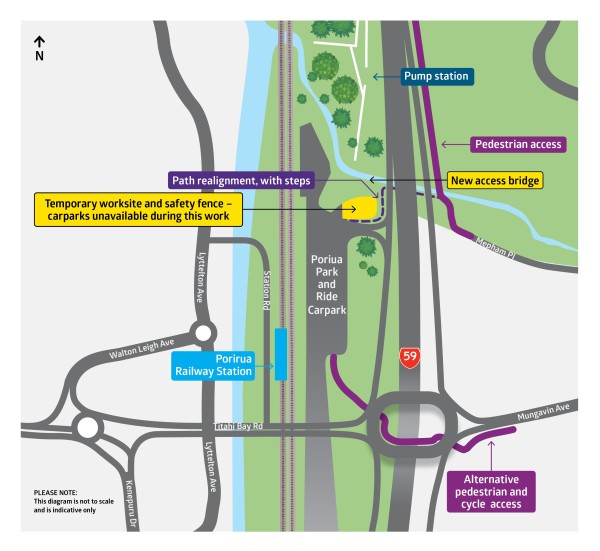

In November and December, cyclists travelling on the path from the railway station under State Highway 59 to Mepham Place will unfortunately face some temporary disruption as we work on the path following construction of an access bridge over Kenepuru Stream.
We are lowering the pathway to provide more clearance for cyclists under the new bridge. We apologise for this temporary disruption and are working hard to complete work on the pathway as soon as possible.
We have always planned to lower the path to provide 2.5 m clearance under the bridge and install lighting, but scheduling meant bridge construction happened ahead of work on the path.
The access bridge is critical for the construction of a new wastewater storage tank and related infrastructure, which will reduce wastewater overflows into the stream and the harbour.
Thank you for your patience while this important work is underway.

A gathering at Kenepuru Stream on 25 May signals the start of the new wastewater storage tank project, designed to help prevent overflows and protect the health of Porirua Stream and Te Awarua-o-Porirua Harbour.
A gathering at Kenepuru Stream on 25 May signals the start of the new wastewater storage tank project, designed to help prevent overflows and protect the health of Porirua Stream and Te Awarua-o-Porirua Harbour.
We were honoured to have Dr Taku Parai, from Ngāti Toa, bless the site for the first stage of construction on one of Porirua’s biggest infrastructure projects.
The blessing was also for the protection of our taiao, specifically the protection of the whenua and the awa.
Over the next few months, a small number of carparks at the northern end of the parking area will be temporarily out of action with construction of the access bridge. However most of the carpark will be unaffected.

Access along the walk and cycle way under the highway to Mepham Place will be maintained, however, there will be some realignment of the pathway. Signage will be in place advising people that there may be a bit of disruption and telling them where alternative routes are.
Our crews are very conscious of the need to minimise disruption to commuters so will ensure any significant traffic movements, such as bringing cranes in, will be timed to avoid peak times!!
Construction will begin later this year on the planned central wastewater storage tank that will significantly reduce wastewater overflows into Te Awarua-o-Porirua Harbour.
Porirua Mayor Anita Baker says this is a major investment in upgrading critical infrastructure to protect the environment and provide for growth.
The tank will be located north of Porirua railway station, between SH1 and the railway line. It will hold up to seven million litres (about three Olympic-sized swimming pools) of wastewater when there is heavy rain.
"I’m pleased that the plans for construction and landscaping will result in an overall positive impact on the environment," Mayor Baker says.
"In addition to reducing pollution of the streams and harbour, this project will protect and restore an area of wetland and many native trees will be planted. Care will be taken throughout construction to protect the habitat of native species including inanga, skinks and geckos, and native birds."
Read the full story at Porirua City Council here and access plans and related documents.

